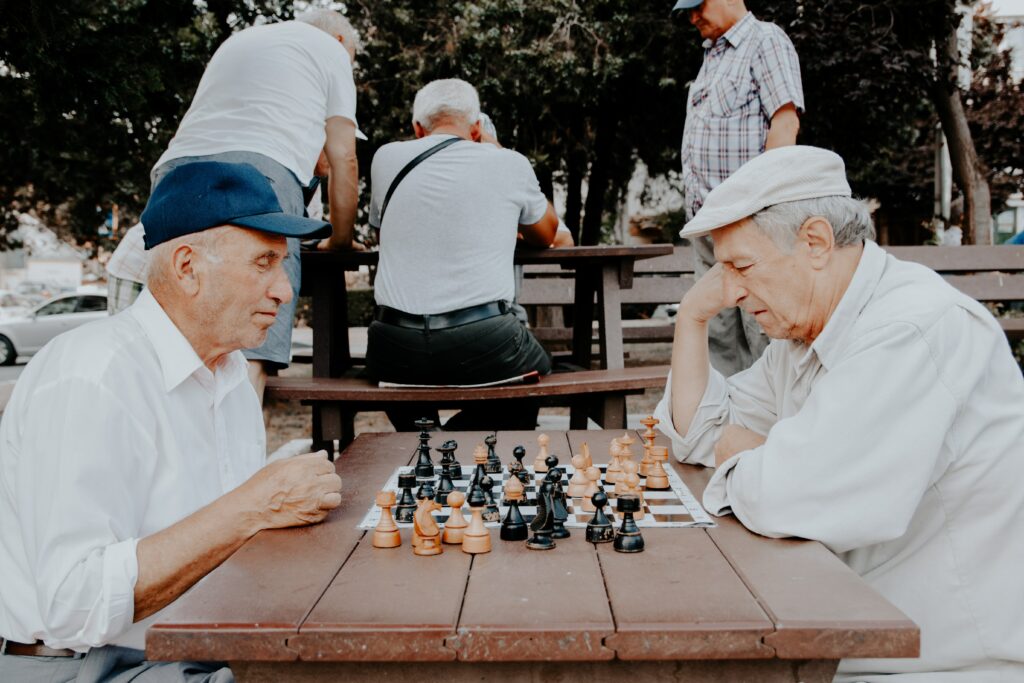Multilingualism keeps you fit! Studies show that older people with foreign language skills are more mentally active than others. Degradation processes that appear to be age-related occur later on average if one has enjoyed higher education and has pursued lively intellectual activity throughout life. However, research studies also show that among people with comparable levels of education, those who speak two or more foreign languages have a clear advantage.
Learning a foreign language is therefore jogging for the brain and counteracts aging processes. Also, studies have shown that even at an advanced age, it is still possible to achieve good learning results. Studies show that older people with foreign language skills are more mentally active than others.
Our brain naturally undergoes aging and degradation processes over time. That is why many older people ask themselves whether it makes sense to learn a foreign language at an advanced age. From the age of 70, the brain’s aging mainly affects short-term and working memory. However, long-term memory, which is responsible for language comprehension, remains well preserved into old age. This explains why my grandfather can still pronounce Italian verbs flawlessly but regularly forgets where he left his hearing aid.
Learning processes may take a little longer than for younger people. Still, older people have the great advantage of drawing on a rich repertoire of knowledge and learning techniques and building up mnemonic bridges that make learning much easier. So what does it matter if you sit a few minutes longer on a foreign language text – in old age, you usually have more time for leisure activities and hobbies anyway.

To make it easier for you to learn a foreign language or brush up on a language you have already learned, we have put together a few valuable tips for you:
1. Take your time
As older people often need a little more time to study, it is essential not to stress yourself. So don’t put yourself under unnecessary pressure. Instead, plan a little more time, and studying for only a few minutes a day is better. Repetition is increasingly important in old age.
2. Start with the topics you can use.
Do you like to go on holiday? Then work with learning materials that cover this topic. There are exciting learning materials for every field of interest. Even a foreign-language text can keep you busy for days or longer and lead you to success (the Birkenbihl method for learning foreign languages is particularly recommended for this purpose).
3. Train your pronunciation
Older people often find it more difficult than younger people to learn the pronunciation of a language perfectly. Multimedia language courses offer a variety of ways to train pronunciation. Native speakers speak texts aloud, which helps you to recognize and internalize the speech melody and rhythm. Repeating the sentences is an excellent way to check your pronunciation. However, it is crucial that you first listen actively and passively to the native speakers often; otherwise, you will quickly acquire an accent.
4. Learning together is more fun
Learning a foreign language on your own is tedious for many. An alternative is to learn together with your partner or with a friend. Watch films together, read books together and help and correct each other.
5. Use your experience
Older people’s experience, learning, and knowledge are usually more extensive than young people’s. Draw on your experience and think about what has helped you most in learning and what tactics have not helped you much. Build mnemonic bridges and use associations to remember things.
So even in old age, you will have success in language learning. In addition to passing the time and having fun, you will train your brain!
Photo by Vidar Nordli-Mathisen on Unsplash
Photo by Vlad Sargu on Unsplash
